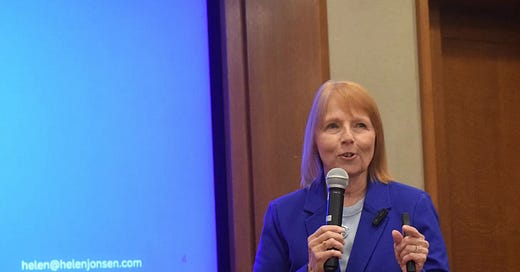[GUEST POST] Your Personal Junket by Helen Jonsen
Everyone speaks for a living. Develop your signature remarks toolkit to be ready for every opportunity.
Optionality member Helen Jonsen has worked with leaders, entrepreneurs, and media voices across channels, from magazines to TV to corporate, so she knows what she’s talking about when it comes to getting your message across, clearly and appropriately for the venue and opportunity in front of you. If you’re living an optionality-driven life, it can be challenging to answer seemingly simple questions like, “What do you do?” Helen has some great advice about how to prepare yourself to answer such questions seamlessly.
Check out her work at her website and subscribe to her Substack for an eclectic overview of all of Helen’s professional and personal interests-Elisa
by Helen Jonsen, April 25, 2025
Speaking for a living
I kicked off a workshop for Harvard Business School alumni by asking, “How many of you speak for a living?” A couple of hands went up right away and then one or two tentatively half-raised their hands.
I laughed and explained: “Let’s think about this. Every one of you go to work – whether in a boardroom, an office, a classroom, or over Zoom -- and every one of you speaks for a living!”
I saw lightbulbs go on around the room and heard a series of knowing chuckles. Now I asked again.
“Who here speaks for a living?”
And all hands went up!
Let me take you through how I arrived on that night.
Press Junkets
Countless times as a journalist, a public relations person would meet the camera crew and me (or just me if I wasn’t doing TV) in the lobby of a hotel and would take us by elevator to the suite where interviews for a new film were being conducted.
Events like this are called press junkets. The stars and moviemakers sit in a room with a movie poster placed in frame and are asked the same not-so-clever questions over and over by everyone from top-tier network journalists and entertainment reporters to bloggers and YouTubers. Each of us would get only 15-20 minutes to interview the subjects because another outlet was coming in right behind us.
The actors are prepped for a junket. They know their talking points. They know what to say about the film or sponsor. They know what parts of their backstory may be churned up once again. And they are ready.
Press conferences
The same goes for politicians and other newsmakers. While it may not be called a “junket,” it’s the same concept. It might be a press conference or a speech followed by Q&A. The person at the podium or in the proverbial spotlight is prepped and ready with important things to say. They stay “on message.”
If they are good at it, they don’t sound rehearsed; they sound genuine. And they may enjoy the repartee.
Now, I don’t remember everyone I sat in those chairs with, stood holding a microphone in front of, or took notes on while standing next to my cameraperson. There were many, from presidential candidates and well-known celebrities to activists and CEOs–all “media-trained” to say the right thing and to answer the questions without going off topic, no matter how hard we journalists tried.
When I moved into public affairs, on the other side of the mic, I coached principals to do the same–to be prepared with introductions, with facts and metrics, with memorable stories that show their humanity and their honest engagement. They were armed with soundbites.
I am not talking about keynote addresses they deliver at an annual meeting or fundraiser. Rather, these are everyday tools for any and every conversation.
After years of coaching people to do this, I realized that everyone should prepare in the same way. Every business person, public official, entrepreneur, nonprofit and community leader, and job seeker needs to be ready and confident when they speak about their mission, their work, their skills, and their passions at every opportunity. It doesn’t come naturally to most. Some are too anxious to speak at all, while others are happy to talk, but they are not memorable or succinct enough for the moment. They need soundbites.
Anyone and everyone should be as ready as that politician or actor because everyone you meet is a potential client, funder, donor, or advocate!
That’s where creating a “signature remarks” toolkit comes into play. It is not media training to meet a journalist. It is for anyone in any setting to be a prepared speaker and conversationalist. It starts withturning your “why” into your passion statement, crafting a few concise, relatable stories, then adding your key talking points. With preparation, you can speak with confidence to own any room and walk away with a win.
This takes time and thought, and, yes, some editing. Once you have narrowed down to a handful of stories and a few key metrics, they cannot languish on a page. You must practice them, so they become easy to recall, easy to say, and easy to be remembered by the folks you are talking to. You want them in your proverbial back pocket, so you can choose the right story for the moment.
Practice is different than memorizing. You don’t want to sound like a robot. You want to be human and authentic. Your words can change slightly but the message should remain the same.
When a chef creates a signature dish, they keep a variety of tools at hand to craft a perfect culinary combination that diners will long remember. Your passion statement, your storytelling, and your key talking points are the ingredients for your signature remarks.
Remember, be prepared because everyone you meet is a potential client, funder, donor, or advocate!





